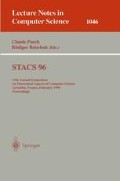Abstract
Classical and quantum information are very different. Together they can perform feats that neither could achieve alone, such as quantum computing, quantum cryptography and quantum teleportation. Some of the applications range from helping to preventing spies from reading private communications. Among the tools that will facilitate their implementation, we note quantum purification and quantum error correction. Although some of these ideas are still beyond the grasp of current technology, quantum cryptography has been implemented and the prospects are encouraging for small-scale prototypes of quantum computation devices before the end of the millennium.
Research supported in part by Canada's Nserc and Québec's Fcar.
Preview
Unable to display preview. Download preview PDF.
References
A. Barenco, “A universal two-bit gate for quantum computation”, Proceedings of the Royal Society, London, Series A, Vol. 449, 1995, pp. 679–683.
A. Barenco, C. H. Bennett, R. Cleve, D. P. DiVincenzo, N. Margolus, P. W. Shor, T. Sleator, J. A. Smolin and H. Weinfurter, “Elementary gates for quantum computation”, Physical Review A, Vol. 52, 1995, pp. 3457–3467.
A. Barenco, D. Deutsch, A. Ekert and R. Jozsa, “Conditional quantum dynamics and logic gates”, Physical Review Letters, Vol. 74, 15 May 1995, pp. 4083–4086.
C. H. Bennett, “Quantum information and computation”, Physics Today, October 1995, pp. 24–30.
C. H. Bennett, H. Bernstein, S. Popescu and B. Schumacher, “Concentrating partial entanglement by local operations”, Physical Review A, in press.
C. H. Bennett, G. Brassard, S. Popescu, B. Schumacher, J. A. Smolin and W. K. Wootters, “Purification of noisy entanglement and faithful teleportation via noisy channels”, Physical Review Letters, in press.
C. H. Bennett and D. P. DiVincenzo, “Quantum computing: Towards an engineering era?”, Nature, Vol. 377, 5 October 1995, pp. 389–390.
C. H. Bennett, D. P. DiVincenzo, J. A. Smolin and W. K. Wootters, “Mixed state entanglement and quantum error correcting codes”, manuscript, 1995.
A. Berthiaume, “L'ordinateur quantique: Complexité et stabilisation des calculs”, PhD Thesis, Université de Montréal, 1995.
A. Berthiaume, “Quantum computation”, in Complexity Theory Retrospective II, L. A. Hemaspaandra and A. Selman, editors, Springer-Verlag, Berlin, in press.
D. Boneh and R. J. Lipton, “Quantum cryptanalysis of hidden linear functions”, Advances in Cryptology—Crypto'95 Proceedings, Lecture Notes in Computer Science, Vol. 963, Springer-Verlag, Berlin, 1995, pp. 242–437.
G. Brassard, “A quantum jump in computer science”, in Computer Science Today, J. van Leeuwen, editor, Lecture Notes in Computer Science, Vol. 1000 (special anniversary volume), Springer-Verlag, Berlin, 1995, pp. 1–14.
A. R. Calderbank and P. W. Shor, “Good quantum error-correcting codes exist”, manuscript, September 1995.
H. F. Chau and F. Wilczek, “Simple realization of the Fredkin gate using a series of two-body operators”, Physical Review Letters, in press.
I. L. Chuang and R. Laflamme, “Quantum error correction by coding”, manuscript, September 1995.
I. L. Chuang, R. Laflamme, P. W. Shor and W. Zurek, “Quantum computers, factoring, and decoherence”, manuscript, March 1995.
I. L. Chuang and Y. Yamamoto, “A simple quantum computer”, manuscript, May 1995.
J. I. Cirac and P. Zoller, “Quantum computations with cold trapped ions”, Physical Review Letters, Vol. 74, 15 May 1995, pp. 4091–4094.
D. Deutsch, A. Barenco and A. Ekert, “Universality in quantum computation”, Proceedings of the Royal Society, London, Series A, Vol. 449, 1995, pp. 669–677.
D. P. DiVincenzo, “Two-bit gates are universal for quantum computation”, Physical Review A, Vol. 51, February 1995, pp. 1015–1022.
D. P. DiVincenzo, “Quantum computation”, Science, Vol. 270, 13 October 1995, pp. 255–261.
P. Domokos, J.-M. Raimond, M. Brune and S. Haroche, “Simple cavity-QED two-bit universal quantum logic gate: The principle and expected performances”, Physical Review A, November 1995, pp. 3554–3559.
T. Folger, “The best computer in all possible worlds”, Discover, October 1995, pp. 90–99.
A. Yu. Kitaev, “Quantum measurements and the Abelian Stabilizer Problem”, manuscript, November 1995.
R. Landauer, “Is quantum mechanically coherent computation useful?”, in Proceedings of the Drexel-4 Symposium on Quantum Nonintegrability—Quantum Classical Correspondence, D. H. Feng and B.-L. Hu, editors, International Press, 1995.
S. Lloyd, “Almost any quantum logic gate is universal”, Physical Review Letters, Vol. 75, 10 July 1995, pp. 346–349.
S. Lloyd, “Quantum-mechanical computers”, Scientific American, October 1995, pp. 44–50.
C. Monroe, D. M. Meekhof, B. E. King, W. M. Itano and D. J. Wineland, “Demonstration of a fundamental quantum logic gate”, Physical Review Letters, Vol. 75, 1995, pp. 4714–4717.
A. Muller, H. Zbinden and N. Gisin, “Underwater quantum coding”, Nature, Vol. 378, 30 November 1995, page 449.
M. B. Plenio and P. L. Knight, “Realistic lower bounds for the factorization time of large numbers on a quantum computer”, submitted to Physical Review A, November 1995.
P. W. Shor, “Scheme for reducing decoherence in quantum computer memory”, Physical Review A, Vol. 52, October 1995, pp. 2493–2496.
P. W. Shor, “Polynomial-time algorithms for prime factorization and discrete logarithms on a quantum computer”, manuscript, August 1995.
T. Sleator and H. Weinfurter, “Realizable universal quantum logic gates”, Physical Review Letters, Vol. 74, 15 May 1995, pp. 4087–4090.
J. A. Smolin and D. P. DiVincenzo, “Five two-bit quantum gates are sufficient to implement the quantum Fredkin gate”, Physical Review A, in press.
A. Steane, “Multiple particle interference and quantum error correction”, submitted to Proceedings of the Royal Society, London, Series A, 1995.
Q. A. Turchette, C. J. Hood, W. Lange, H. Mabuchi and H. J. Kimble, “Measurement of conditional phase shifts for quantum logic”, manuscript, June 1995.
W. G. Unruh, “Maintaining coherence in quantum computers”, Physical Review A, Vol. 51, February 1995, pp. 992–997.
V. Vedral, A. Barenco and A. Ekert, “Quantum networks for elementary arithmetic operations”, submitted to Physical Review A, 1995.
Author information
Authors and Affiliations
Editor information
Rights and permissions
Copyright information
© 1996 Springer-Verlag Berlin Heidelberg
About this paper
Cite this paper
Brassard, G. (1996). New trends in quantum computing. In: Puech, C., Reischuk, R. (eds) STACS 96. STACS 1996. Lecture Notes in Computer Science, vol 1046. Springer, Berlin, Heidelberg. https://doi.org/10.1007/3-540-60922-9_1
Download citation
DOI: https://doi.org/10.1007/3-540-60922-9_1
Published:
Publisher Name: Springer, Berlin, Heidelberg
Print ISBN: 978-3-540-60922-3
Online ISBN: 978-3-540-49723-3
eBook Packages: Springer Book Archive

